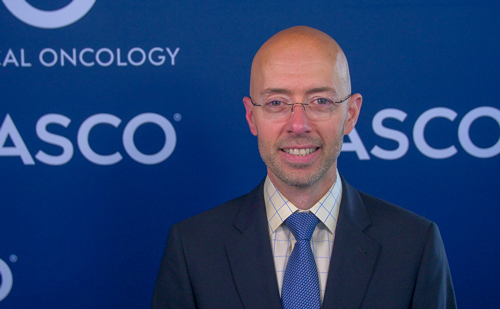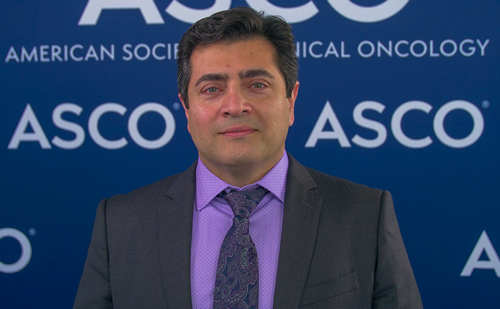Kidney cancer, of which renal cell carcinoma (RCC) is the most common, accounts for around 3% of all cancers worldwide.1 The disease presents a substantial health and economic burden, since approximately 25–30% of patients with RCC have metastatic disease at the time of diagnosis.2 Without treatment, the 5-year survival of metastatic RCC is only 8%.3 There is, therefore, a significant need for improved therapies for this disease.
The use of targeted therapy has become the mainstay of treatment of advanced RCC but is not curative; complete responses are rare and relapse due to acquired drug resistance inevitably occurs. However, treatment regimens involving immunotherapy, particularly in combination with vascular endothelial growth factor (VEGF)-targeted agents, are showing great promise in this treatment setting. Two major types of combination regimens are being tested in advanced RCC: the combination of two immunotherapy agents and combinations of an anti-VEGF agent and an immunotherapy agent. In December 2017, the US Food and Drug Administration (FDA) granted Breakthrough Therapy designation to the combination of the PD-L1 immune checkpoint inhibitor, avelumab (Bavencio®; Pfizer, New York, NY, US), with the anti-VEGF tyrosine kinase inhibitor (TKI) axitinib (Inlyta®; Pfizer, New York, NY, US), for previously untreated patients with advanced RCC. Approval was based on preliminary data from the phase Ib JAVELIN Renal 100 trial.4
So far, 2018 is proving to be a landmark year in the development of immunotherapy for RCC. Earlier this year, the FDA approved nivolumab (Opdivo®; Bristol-Myers Squibb, New York, NY, US) plus ipilimumab (Yervoy®; Bristol-Myers Squibb, New York, NY, US) for the treatment of patients with intermediate or poor risk, treatment-naive advanced RCC. Approval was based on the results of the CheckMate 214 study.
5 This was followed by the announcement at the 2018 ASCO meeting of the results of the phase II KEYNOTE-427 study, in which pembrolizumab (Keytruda®; Merck, Kenilworth, NJ, US) showed promising antitumor activity as monotherapy in treatment-naive patients with clear cell RCC, with an overall response rate (ORR) of 38%.6
Recent data suggest that pembrolizumab is also effective in the combined treatment setting. Initial studies exploring the combination of VEGF inhibitors combined with PD-1 checkpoint inhibitors were hampered by excess toxicity, many of which were associated with off-target effects of multitargeted TKIs.7 Subsequent studies have focussed on the use of more selective VEGF inhibitors. At the ASCO Genitourinary Cancers Symposium in February, results of a phase Ib dose-finding/dose-expansion study, showed that combined treatment with pembrolizumab plus axitinib gave an overall response rate of 73% in patients with previously untreated advanced RCC, including a complete response in 7.7%, partial response 65.4%, and stable disease in 15.4%. The combination doubled the efficacy of each drug when used as monotherapy, an unprecedented finding. The most common serious adverse events included high blood pressure, diarrhoea, fatigue, and increased levels of the liver enzyme ALT. Fewer liver function test abnormalities and less fatigue were reported compared with other combinations of VEGF inhibitors and PD-1 checkpoint inhibitors.8
These positive findings have been confirmed with the release in October 2018 of data from the open-label phase III KEYNOTE-426 trial (ClinicalTrials.gov Identifier: NCT02853331). In this study, 861 patients with advanced or metastatic RCC were randomly assigned to first-line treatment with pembrolizumab plus axitinib for up to 24 months, or monotherapy with sunitinib. Results showed that the combination of pembrolizumab and axitinib met both primary endpoints of overall survival and progression-free survival. In addition, the combination showed significant improvements in ORR compared with sunitinib. The results were independent of PD-L1 positivity and were seen across all risk groups.
In a press release, Roger M Perlmutter, MD, PhD, President, Merck Research Laboratories, said: ‘Keytruda, in combination with the tyrosine kinase inhibitor Inlyta, resulted in significant and clinically meaningful improvements in overall survival, progression-free survival, and objective response in this phase III study. This marks the first time that combination treatment with an anti–PD-1 therapy has achieved the dual primary endpoints of overall survival and progression-free survival as first-line therapy in advanced renal cell carcinoma.’9
Many immunotherapies are now being studied in combination with anti-VEGF therapies in the setting of advanced and metastatic RCC; promising early findings have been released from the phase III IMmotion 151 study of atezolizumab (Tecentriq®; Genentech, South San Francisco, CA, US), an anti-PD-L 1 inhibitor, plus the anti-VEGF antibody bevacizumab.10 In addition, a number of other combinations, including pembrolizumab plus lenvatinib (ClinicalTrials.gov Identifier: NCT02811861), avelumab plus axitinib (ClinicalTrials.gov Identifier: NCT02684006), and nivolumab plus cabozantinib (Cometriq®; Exelixis, South San Francisco, CA, US [ClinicalTrials.gov Identifier: NCT03141177]) are currently being evaluated in phase III studies.11 However, it will be important to manage toxicities associated with these regimens. While the safety profiles of combination immunotherapy regimens appear to be better than those of systemic cytotoxic chemotherapies, it is essential that immune-related adverse events are identified quickly because they can become severe and, in some cases, life-threatening.
In summary, the first-line treatment landscape for RCC is evolving rapidly. Positive findings from the KEYNOTE-426 trial add to the wealth of recent data supporting the use of immunotherapy in combination with anti-VEGF agents. It seems likely that one or more of these combined immunotherapies will soon become a standard of care.
References
1. Ferlay J, Soerjomataram I, Dikshit R, et al. Cancer incidence and mortality worldwide: sources, methods and major patterns in GLOBOCAN 2012. Int J Cancer. 2015;136:E359–86.
2. Gupta K, Miller JD, Li JZ, et al. Epidemiologic and socioeconomic burden of metastatic renal cell carcinoma (mRCC): a literature review. Cancer Treat Rev. 2008;34:193–205.
3. American Cancer Society. Survival Rates for Kidney Cancer by Stage, 2017. Available at: www.cancer.org/cancer/kidney-cancer/detection-diagnosis-staging/survival-rates.html (accessed 29 October 2018).
4. Choueiri TK, Larkin J, Oya M, et al. Preliminary results for avelumab plus axitinib as first-line therapy in patients with advanced clear-cell renal-cell carcinoma (JAVELIN Renal 100): an open-label, dose-finding and dose-expansion, phase 1b trial. Lancet Oncol. 2018;19:451–60.
5. Motzer RJ, Tannir NM, McDermott DF, et al. Nivolumab plus ipilimumab versus sunitinib in advanced renal-cell carcinoma. N Engl J Med. 2018;378:1277–90.
6. McDermott DF, Lee, J-L, Szczylik C, et al. Pembrolizumab monotherapy as first-line therapy in advanced clear cell renal cell carcinoma (accRCC): Results from cohort A of KEYNOTE-427. J Clin Oncol. 2018;36(suppl 15):Abstr 4500.
7. Kuusk T, Albiges L, Escusier B et al. Antiangiogenic therapy combined with immune checkpoint blockade in renal cancer. Angiogenesis. 2017;20:205–15.
8. Atkins MB, Plimack ER, Puzanov I, et al. Axitinib in combination with pembrolizumab in patients with advanced renal cell cancer: a non-randomised, open-label, dose-finding, and dose-expansion phase 1b trial. Lancet Oncol. 2018;19:405–15.
9. Merck Press Release: Merck’s KEYTRUDA® (pembrolizumab) in Combination with Pfizer’s Inlyta® (axitinib) Significantly Improved Overall Survival (OS) and Progression-free Survival (PFS) as First-Line Therapy for Advanced or Metastatic Renal Cell Carcinoma, 2018. Available at: https://investors.merck.com/news/press-release-details/2018/Mercks-KEYTRUDA-pembrolizumab-in-Combination-with-Pfizers-Inlyta-axitinib-Significantly-Improved-Overall-Survival-OS-and-Progression-free-Survival-PFS-as-First-Line-Therapy-for-Advanced-or-Metastatic-Renal-Cell-Carcinoma/default.aspx (accessed 29 October 2018).
10. Motzer RJ, Powles T, Atkins MB, et al. IMmotion151: a randomized phase III study of atezolizumab plus bevacizumab vs sunitinib in untreated metastatic renal cell carcinoma (mRCC). J Clin Oncol. 2018;36(suppl):578.
11. Procopio G, Ratta R, de Braud F, Verzoni E. Combination therapies for patients with metastatic renal cell carcinoma. Lancet Oncol. 2018;19:281–3.




